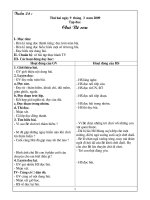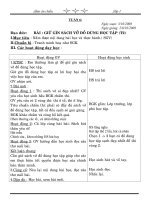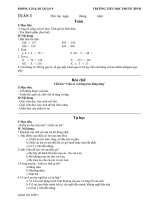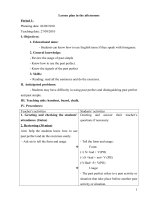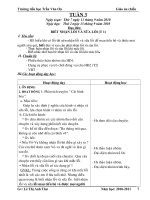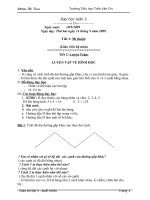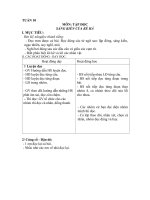giao an chieu
Bạn đang xem bản rút gọn của tài liệu. Xem và tải ngay bản đầy đủ của tài liệu tại đây (145.72 KB, 17 trang )
Lesson plan in the afternoons
Period 1:
Planning date: 26/09/2010
Teaching date: 27/09/2010
I. Objectives:
1. Educational aims:
- Students can know how to use English tense if they speak with foreigners.
2. General knowledge:
- Review the usage of past simple
- Know how to use the past perfect.
- Know the signals of the past perfect
3. Skills:
+ Reading: read all the sentences and do the exercises.
II. Anticipated problems:
- Students may have difficulty in using past perfect and distinguishing past perfect
and past simple.
III. Teaching aids: handout, board, chalk.
IV. Procedures:
Teacher’s activities Students’ activities
1. Greeting and checking the students’
attendance (2mins)
2. Reviewing (30 mins)
Aim: help the students know how to use
past perfect and do the exercises easily.
- Ask sts to tell the form and usage
Greeting and answer their teacher’s
questions if necessary.
- Tell the form and usage:
Form:
(+) S+ had + V(PII)
(-) S +had + not+ V (PII)
(?) Had+ S+ V(PII)
Usage:
- The past perfect refers to a past activity or
situation that take place before another past
activity or situation.
1
- Ask and guide sts how to do each
exercise.
- Ask Sts to do Exercise 1 in 7 mins and
then compare with their friends.
- Move around the class and provide help if
necessary.
- Call some sts to come to the board to do
each exercise and check.
- Ask sts to explain the reason why the
verbs used in past perfect or past simple.
3. Homework (3 mins)
Do all the exercises of language focus
(p.19, 20, 21-workbook)
-……………….
- Listen to their teacher.
- Do exercise 1 and compare with their
friends.
- Come to the board to do each exercise and
then listen to their teacher’s checking.
-Explain their answers.
-Write their homework on their notebooks.
EXERCISE
I. Put the verbs in the past perfect or past simple.
1. I (go) to the box office at lunch time, but they (already/ sell) all the tickets.
...................................................................................................................
2. I (feel) very tired when I (get) home, so I (go) straight to bed.
.................................................................................................................
3. I felt better by the summer, but the doctor (warn) me not to do too much. I (be)
very ill.
.....................................................................................................................
4. At last, the committee (be) ready to announce their decision. They (make) up
their mind.
.........................................................................................................................
5. Last night, I (go) to Jim’s room and (knock) on the door but there (be) no
answer. Either he (go) out or he (not want) to see anyone.
..............................................................................................................................
6. Angel (ask) me how to use the photocopier. She (never/ use) it before, so she
(not/ know) it.
.............................................................................................................................
7. Karen (not want) to come to the cinema with us because she (already/ see) the
film.
........................................................................................................................
8. When the students (do) the experiment, they (write) a report on it.
...........................................................................................................................
9. Two days ago, I (meet) an old friend who I (not see) for years.
..........................................................................................................................
2
10. The house (be) very quiet when I (get) home. Everybody (go) out for dinner.
..........................................................................................................................
II. Cross and correct one VERB in the wrong tense in each sentence
1. It was lucky that we have decided to buy our tickets in advance.
………………………………………………………………………………………
2. I was pleased to see my old friends last week as we didn’t see each other since we
finished our course.
………………………………………………………………………………………….
3. We have to wait for hours at the airport because the bad weather had delayed all the
flights.
…………………………………………………………………………………………
4. We missed our train, so by the time we reached the theater, the play ended and the
audience was leaving the theater.
…………………………………………………………………………………………
5. When I came out of the cinema, I had found that a thief had taken my car radio.
…………………………………………………………………………………………
III. Complete the sentence
1. It/ obvious/ he/ only/ interested/ make money.
……………………………………………………………………………………
2. I/ not/ be/ cinema/ for two months/ because/ busy/ exams.
……………………………………………………………………………………
3. We/ arrive/ party/ last night/ after/ Tom/ leave.
...................................................................................................................................
4. Marie Curie/ receive/ some scientific training/ father.
...................................................................................................................................
Nam/ suddenly/ realize/ he/ not/ close/ all/ windows/ his room.
...................................................................................................................................
5. The film/ end/ by/ time/ we/ take/ right/ seats.
……………………………………………………………………………………
Keys:
Exercise I:
1. went……..had already sold
2. felt……….got……..went
3. warned …….had been
4. was…….had made
5. went……..knocked……. was…….had gone………..didn’t want
6. asked…….had never used……….didn’t know
7. didn’t want……..had already seen
8. had done………wrote
9. met……….hadn’t seen
10. was……got…..had gone
Exercise II:
3
1. have-> had
2. didn’t see-> hadn’t see
3. have-> had
4. ended-> had ended
5. had found-> found
Exercise III:
1. It is obvious (that) he is only interested in making money.
2. I haven’t been to the cinema for two months because I am busy with my exams.
3. We arrived at the party last night after Tom had left.
4. Marie Curie received some scientific training from her father.
5. Nam suddenly realized he had not closed all the windows of his room.
6. The film ended by the time we had taken the right seats.
Period 2
Planning date: 03/10/2010
4
Teaching date: 04/10/2010
I. Objectives:
- Students can review phonetics, the way of marking stress, tenses.
2. General knowledge:
- Review the usage of past simple
- Know how to use the past perfect.
- Know the signals of the past perfect
3. Skills:
+ Reading: read all the sentences and write the exercises.
II. Anticipated problems:
- Students may have difficulty in picking out the word whose underlined part is
pronounced differently from that of the other words, and distinguishing present perfect,
past perfect and past simple.
III. Teaching aids: handout, board, chalk.
IV. Handout
UNIT 3: PEOPLE'S BACKGROUND
A. PHONETICS
I. Pick out the word whose underlined part is pronounced differently from
that of the other words.
1. A. contain B. said C. pail D. paid
2.' A. bank B. romance C. fancy D. famous
3. A. fast B. cast C. catch D. vast
4. A. bed B. severe C. send D. pen
5. A. tragic B. mature C. husband D. another
II. Pick out the word that has the stress pattern different from that of the other
words.
6. A. determine B. radium C. private D. tutor
7. A. condition B. general C. professor D. another
8. A. physics B. chemistry C. degree D. science
9. A. institute B. radium C. human D. atomic
10. A. position B. impossible C. award D. colour
III. Pick out the word whose underlined part is pronounced differently from that
5
of the other words.
1. A. dream B. stream C. ready D. beam
2. A. cream B. feather C. instead D. sweat
3. A. make B. fame C. cake D. bad
4. A. fat B. private C. cat D. mad
5. A. spend B. send C. lend D. become
B. TENSES
IV. Put the verb in brackets into the correct tense:
1. Until yesterday I (never hear) -------- about it.
2. Sam (already leave) ------------------------- when we (get) ------------------------- there
3. How you (break) ------------------------- your arms?
4. How long (you/ study) ----------------- English?
- I (learn) ----------------- English since I was twelve
5. Who is that woman? I (never/ see) ----------------- her before
6. I (phone) -----------------you when I (get) ----------------- home from work.
7. While Dad (watch) ----------------- TV last night, Mum (read) ----------------- the
newspaper.
8. I (slip) ------------------------- on the ice while I (cross). When I got home, Bill (lie)
----------------- on the sofa. The television was on but he (not / watch) ------------- it.
He (fall) ------------asleep and (snore) --------------loudly. I (turn) ---------- the
television off and just the he (walk) ----------------- the street
9. I (meet) -----------------Mary while I (go) -------------- to the bookshop yesterday. I
(ask) -------------- her to go with me. She and I (want) ---------- to find a good
dictionary. At last both of us (buy) ------------the same ones after we (look)
-------------for and (read) --------- many kinds of dictionary carefully
10. (you/ meet) ----------------- Tom at the party last night?
- No, he (already/ go) ----------------- home when I (arrive) ----------------- at the
party.
III. WH – QUESTIONS
Make Wh-question for the underlined words:
1. My aunt and uncle live in Chicago.>> Where
2. We often have dinner at 7:00 pm. >>
6

